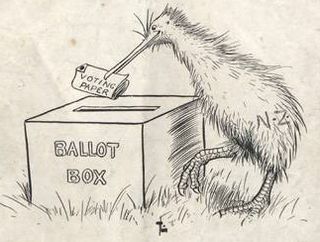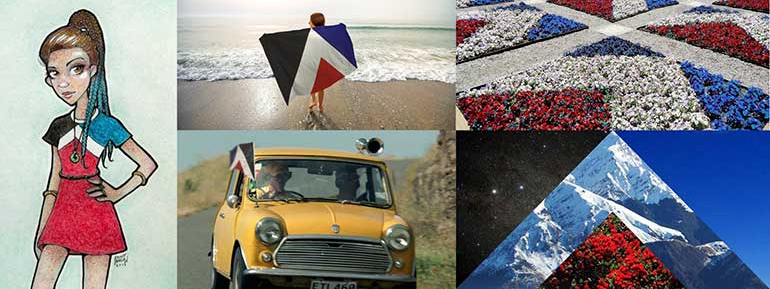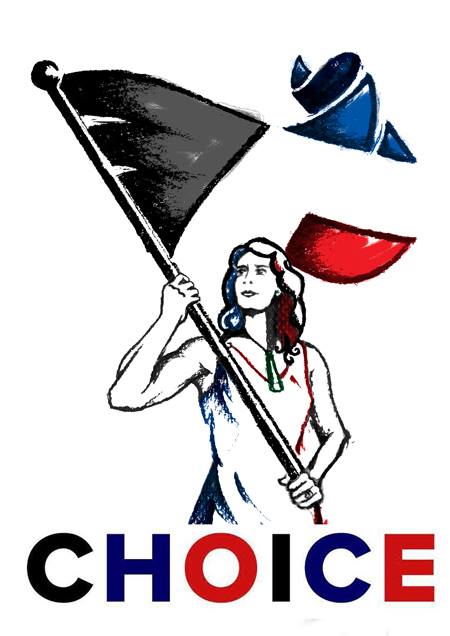If you feel bored, annoyed or really just don’t care about the flag debate, you’re not alone.
Let’s face it, it seems like there are more important issues in New Zealand we should focus on – our massive problem with child poverty for instance, or that we don’t get a say on the TPP, or that our environment is far from 100% pure.
Add to that the events happening around the world right now and it certainly seems like there are some much bigger problems to worry about than changing our flag.
But the thing is, all these issues are connected to the question that's also underlying our flag debate: What’s going on with democracy in New Zealand?
What’s so Kiwi about democracy?

After the events in Paris last week, New Zealand stood up in solidarity for liberté, égalité, fraternité – universal democratic values that our world-leaders believe are under attack by terrorism.
Our MPs gave speeches, we lit up our monuments with the Tricolor, people gathered for public vigils and we changed our Facebook pics en-masse. It was a tribute to the French people who lost their lives – but also a political statement that in New Zealand, we too, hold the values of democracy dear.
We have a proud history of democracy here in New Zealand. In fact, we have one of the oldest and most enduring democracies in the world. We led the world when we extended the right to vote to women in 1893. And our national identity has been shaped by iconic democratic moments, like the Springbok tour, our nuclear-free stance and Maori hikoi.

What began as a system inherited from the ‘Motherland’, evolved into a distinctly Kiwi style of democracy: intimate, inclusive and big on participation. Our representatives in Parliament were extremely accessible and open, and held highly accountable for their actions. And we had an enormous pride in our sense of equality and fairness as a nation.
What’s happening to our democracy?
While many of the traditions of Kiwi democracy have stuck around, things are changing. We’re starting to see a decline in voter turnout, especially amongst young people. We’re seeing less transparency and accountability from our MPs. And we’re fast becoming a world-leader in inequality.
It seems we’re not immune to the same problems plaguing democracies around the world. Because, here’s the kicker: terrorism isn’t the only threat to democracy today. When we fail to nurture and protect the democratic system from within, it can quickly decay.
What can we do about democratic decay in New Zealand?
You might feel like this whole flag process has been anti-democratic – that it's a way to divert our attention, or an empty gesture that only highlights how we’re not getting to have our say on the things that really matter. Maybe you reckon that it’s just a vanity project for the PM, that it’s all rigged and that it’s a waste of money too.
All these arguments are valid, and I’d almost forgive you for flagging the referendum altogether because of them. But instead, I want to put an idea to you. It’s a way you can take advantage of this flag change game – by choosing a new symbol for the country that takes a stand, a new symbol that represents the values of democracy in New Zealand.
It’s Red Peak.
Yes, it might seem ridiculous to think that a flag elected by such a botched process could ever truly represent democracy, but hear me out.
It’s about the democratic potential of abstract design.

One of the reasons Red Peak has been contentious is because it’s abstract. It’s a deceptively simple design made up of blocks of colour, which are open to interpretation – designed specifically to carry many of New Zealand’s stories.
And that’s where the political power of the design lies.
Red Peak asks us, what do you see? What's your story of New Zealand? And are we living up to it? It lets everyone have their say about what’s important for New Zealand. And in doing that, it reminds us that everyone’s got the right to a different opinion.
It’s about free speech and critical thought. It’s about equality and tolerance. It’s about engagement and participation. These are the values of democracy.
You could think of it as the meetinghouse for our discussion on nationhood. It reflects back at us our own healthy debate about our constitution and national identity. When we hear arguments playing out in the media about what Red Peak really means – we see proof of this design working. Even the negative interpretations are valid and worth consideration.
If you’re thinking: “Yeah right, this all sounds pretty far-fetched to me”, let’s look at it in a more practical way, how it works on the simplest level – for our school kids.
Passing down our democratic values to the next generation.
We have a big problem with the way we teach the concepts of democracy to our kids in New Zealand. Research shows that we have one of the worst gaps between our rich kids and our poor kids in terms of their civic knowledge (that’s their understanding of how democracy works).
“Some New Zealanders are thriving in civics education, and well on the way to becoming engaged, participating and active citizens, others are preparing instead for a life of disengagement and civic exclusion.” The Wireless
From the get-go, we’re disadvantaging the groups who are in most need of a democratic voice. The effect of that is serious. It contributes to perpetuating inequality in the next generation. And it feeds the dangerous sense of powerlessness in our young people.
With Red Peak we have a golden opportunity to create an amazing civic education tool. One bold, national symbol that can kick-start an imaginative, fun and varied approach to teaching civics, that better provides for New Zealand’s multicultural society at every socio-economic level. This is one of the most significant jobs a flag could do for our country.

We’ve only just scratched the surface, but already Red Peak’s proven itself as an incredibly accessible entry point into political engagement. All sorts of Kiwis have been using Red Peak as a canvas to have their say about New Zealand’s national identity, in their own way.
So how will you vote?
When the flag takes on this role, becoming a powerful tool to help us defend New Zealand’s democracy, we have a flag that’s worth it’s $26m+ price tag. It's a flag that unseats the PM's vanity project with a much bigger message: an assertion that our national identity remains inextricably linked to the values of democracy, no matter who is the leader of the day.
Now, we have the opportunity to use the mechanisms of democracy itself – the ballot – to deliver that message.

Information about the history of democracy in New Zealand is from - Miller, Raymond : Democracy in New Zealand, Auckland Univ. Press, 2015